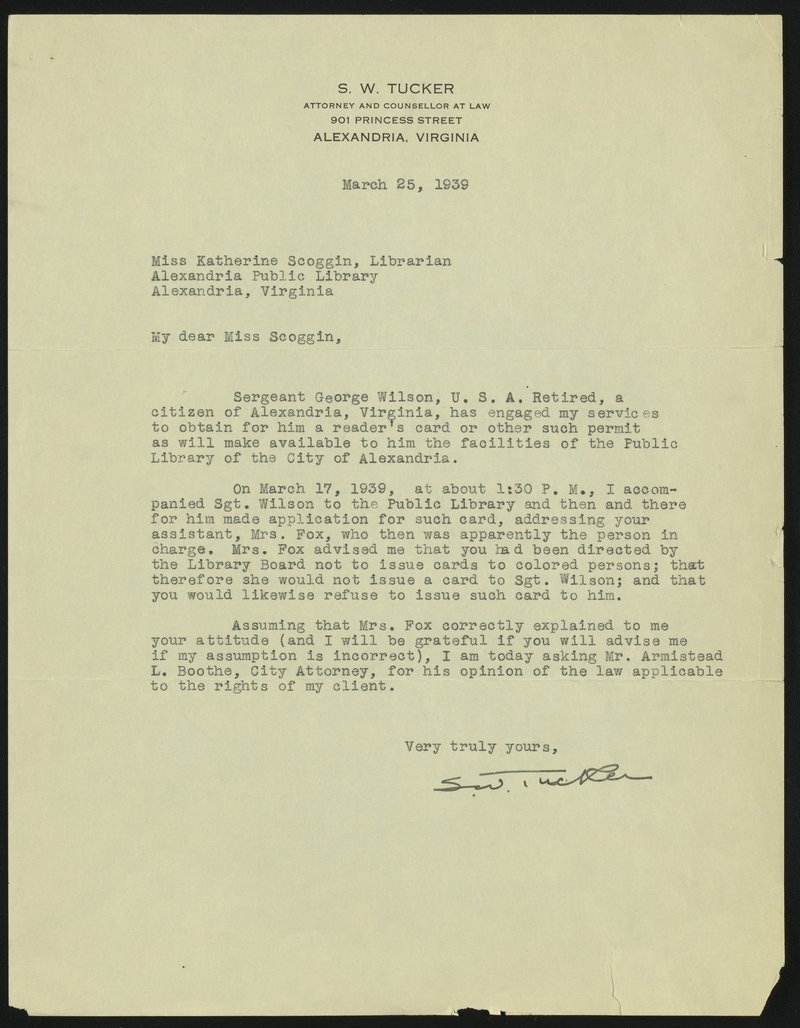The 1939 Library Sit-In Project Sheds Light on an Important Civil Rights Event | Editors’ Note
On August 21, 1939, five Black men quietly sat down to read in the Alexandria (VA) Public Library after being refused a library card. Occurring years before more widely known efforts to desegregate lunch counters beginning in the 1950s, the Alexandria Library sit-in is the focus of a project to digitize and distribute related materials and teaching resources.

A confession: there are way too many tabs open currently on my browser. I won’t cop to the number, but it’s a lot. There’s content that informs my perspective in addition to the work (OK, sometimes Wordle, too). Some of those tabs stay open and gnaw at me to share. One of them is a project created around a remarkable event.
On August 21, 1939, five Black men entered the Alexandria (VA) Public Library and asked for a library card. After the librarian refused their request, William Evans, Edward Gaddis, Morris Murray, Clarence Strange, and Otto L. Tucker each pulled a book from the shelf and quietly sat down to read. The police came to remove the five men, who were charged with disorderly conduct.
Occurring years before the more widely known efforts to desegregate lunch counters beginning in the 1950s, it was the first recorded direct act to integrate libraries, “recognizing their importance as learning instruments,” according to Brenda Mitchell-Powell, who wrote a book about the event, Public in Name Only (University of Massachusetts, 2022).
The 1939 Library Sit-In Project is led by Washington, DC-based think tank New America, which together with local partners, will pursue research and disseminate material, including teaching resources, in a multi-year effort to amplify a lesser-known account in the struggle for civil rights.
Funded by the William & Flora Hewlett Foundation, the National Historical Public Records Commission, and the National Endowment for the Humanities, the Project couldn’t be more on point, coming at another critical moment for equal access.
“There are a lot of local heroes in this story,” says Lisa Guernsey, director of the Learning Sciences Exchange and senior fellow and strategic advisor in Education Policy at New America. Guernsey, the Project lead, cites Rose Dawson, executive director of the Alexandria Library, who has foregrounded the sit-in as a major element of her tenure. The first African American leader of the library, Dawson was not aware of the sit-in until she took the job in 2008, she told Guernsey in an interview. Since then, Dawson, who started out as a children’s librarian, has raised up the sit-in each year, with an 85th anniversary celebration happening in 2024.
It’s a testament to the support Dawson and the library have in the community and the power of good partnerships, notes Guernsey. “And then there were librarians even before her who did incredible work” to preserve related artifacts. Inspired, Guernsey pursued New America’s involvement to gain national recognition of the sit-in “to ensure the story isn’t forgotten and we can learn from it.”
Digitization is key to the Library Sit-In Project, ensuring a quality, accessible archive for sharing primary source materials with a broader audience.
In 2025, related workshops will help educators bring the Project into classrooms. Guernsey expects students themselves will engage with the materials to explore, inquire, and draw their own meaning from this bit of hard regional history.
Any advice for libraries inspired to engage their local past? “Be aware of anniversary events, and dig into your own history,” says Tricia Walker, branch manager, Local History and Special Collections at Alexandria Library. Don’t have the necessary staff? Tap into an archivist in the community. Reach out to a local college or university or your state library, which can provide a referral.
As it was in 1939, the tenor of the times can drive action of one kind (See “Disinvited”) and another (“Speaking Up”). Example is all around us.

Pictured: Letter sent from Samuel W. Tucker, an African American lawyer, to Alexandria librarian Katherine Scoggin March 25, 1939.
Source: Alexandria Library Special Collections
Resources:
- Public in Name Only: The 1939 Alexandria Library Sit-In Demonstration, by Brenda Mitchell-Powell (University of Massachusetts Press, 2022).
- What Was the Library Sit-In of 1939?
Conversations with Researchers and Community Members in Alexandria, VA - Using Tech to Spread the Story of the 1939 Library Sit-in
New America Project Includes Digitizing Collections and Designing an Online Exhibit - 1939 ALEXANDRIA LIBRARY SIT-IN
- Alexandria Library Celebrates 85th Anniversary of 1939 Library Sit-In
“A Legacy of Courage”

RELATED
The job outlook in 2030: Librarians will be in demand
The job outlook in 2030: Librarians will be in demand
ALREADY A SUBSCRIBER? LOG IN
We are currently offering this content for free. Sign up now to activate your personal profile, where you can save articles for future viewing







Add Comment :-
Be the first reader to comment.
Comment Policy:
Comment should not be empty !!!